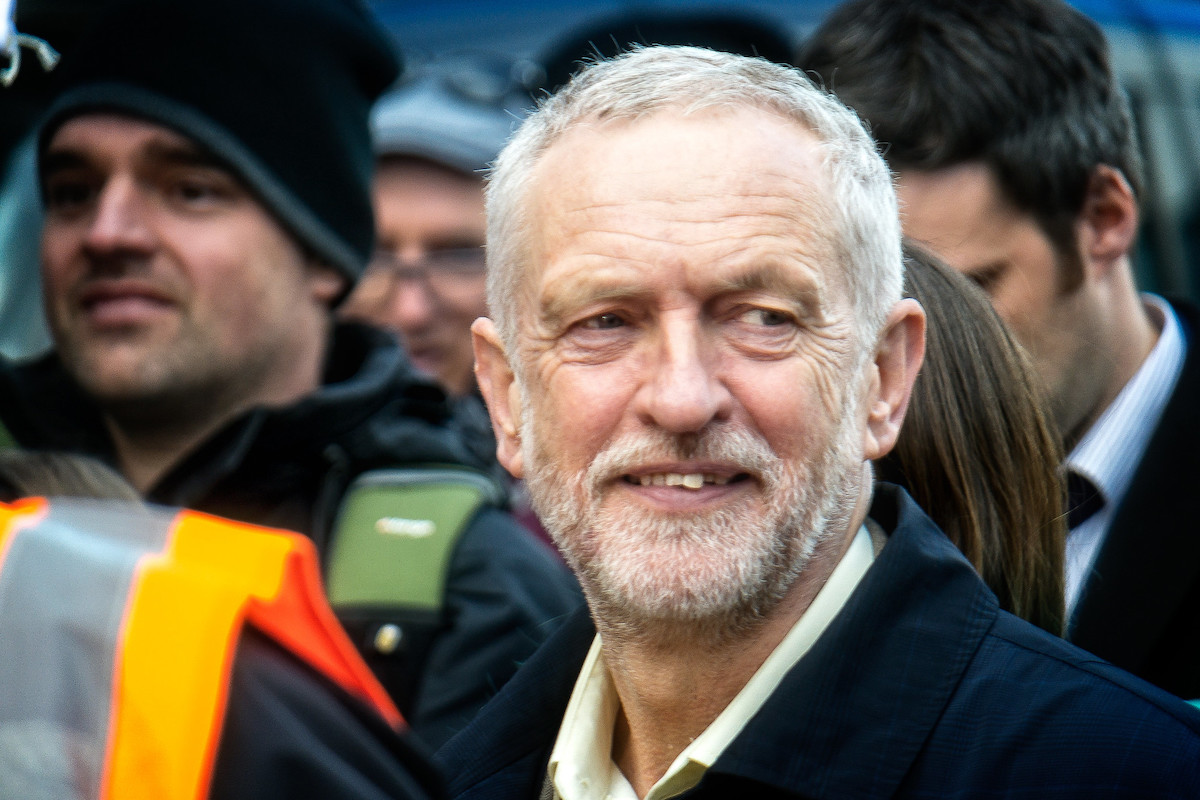Top Stories
The Jewish Dilemma
The rise of global antisemitism seems certain to accelerate the demographic decline of Jews in most of the world, and their eventual concentration in Israel.

Es iz schwer tzu sein a yid. It is hard to be a Jew.
~Sholem Aleichem
When Britain’s Jews go to the polls next week, they do so at an uncomfortable moment. For the first time in at least a half century, their community—roughly 330,000 citizens—has become a major, if unwelcome, political issue. Labour leader Jeremy Corbyn is a long-standing ally of the Islamic Republic of Iran and its terrorist proxies Hamas and Hezbollah, and a fierce opponent of Israel’s right to exist, so the prospect of him becoming Prime Minister has made Jews nervous. As the New York Times suggests, British Jews are “Labourites practically by birth,” but many of them are likely to vote Conservative this time around.
The dilemma British Jews face is an increasingly common one across Europe. Britain’s Jews may not much like Boris Johnson, as they opposed Brexit by a factor of two-to-one, but many, in the words of the former Chief rabbi Jonathan Sacks, see the prospect of Corbyn’s election as “an existential crisis.” Polls suggest that just six percent of UK Jews plan to vote Labour.
What is occurring in Britain, and much of Europe, reflects changes in the nature of antisemitism. In the past, this oldest of prejudices was widely linked to the far-Right, where it still resides. But in many countries today, the primary instigators of anti-Jewish conspiracism tend to be found on the Left, and often allied with Muslim activists. Under this pressure, it is increasingly dubious that Europe’s Jewish communities can do anything but decline.
Whether from the Right or the Left, from Muslims, reactionary Christians, or progressive Greens, European Jews are confronted by a threat not seen since the 1930s. Some 90 percent of European Jews, according to recent surveys, have experienced antisemitic incidents, and more than 80 percent of European Jews aged 16 to 34 believe antisemitism is a growing problem in their countries. According to a recent EU survey, half of German and Belgian Jews and well over a third of Jews in France, the United Kingdom, and Sweden report being harassed for their religious affiliation; the rates have grown everywhere over the past five years.
If these trends persist, we can expect Europe’s Jewish populations to erode further. The triumph of Corbyn—a man 87 percent of British Jews polled believe to be an antisemite—could cause nearly half to “seriously consider” emigrating, most likely to more congenial places like Israel, the United States, Australia, and Canada. France’s Jewish population, the largest in Europe, has been sustained largely by the mass migration from North Africa, although that source has pretty much dried up now. Even so, France still has fewer Jews than it did in 1939 and that number seems destined to continue shrinking. Since 2000, nearly 50,000 Jews have left, mostly for Israel, the United States, or Canada
In fact, it’s hard to find a place in Europe—with the odd exception perhaps of Hungary—where Jewish prospects are anything but dismal. Eastern Europe, the center of the Jewish world in 1939 with its eight million Jews, has less than 400,000 today. Germany, home to 500,000 Jews in 1933, now has as little as a third of that, most originally refugees from eastern Europe. Fewer than 15,000 of the Jews living in Germany today can trace their roots to the pre-Nazi era.
Threat from the Right
Some of the recent growth in antisemitism follows familiar patterns. As in the past, a stagnant economy seems to stir up grassroots suspicion. During the period of European prosperity in the decades following the Second World War, most middle- and working-class people could count on steady employment and health pensions. Today, 14 percent of all European jobs are part-time, more than three times the rate of the US, and that figure reaches over 16 percent in Italy, over 20 percent in the Netherlands, and 27 percent in Spain.
This makes Jews vulnerable to the conspiratorial suspicion that they do better because they “rig” the economy. As historian Edward Luttwack has pointed out, this trope dates back at least to Hellenic Alexandria where Greeks perceived Jews as both too clannish and too successful, leading to vicious pogroms. Luttwack suggests that Jewish success today in the media, finance, particularly private equity and mergers, as well as technology (for example, the founders of Qualcomm, Facebook, and Google are all Jews) provides specious justification for the resurrection of these old canards.
Perceptions of Jewish success combined with a weak economy and the shrinkage of the middle class has ignited a resurgence of right-wing populism across the continent. In some countries, notably Russia, Poland, Belgium, and parts of Germany, antisemitism of the traditional right-wing variety has been mainstreamed, often by nationalist parties such as the AfD in Germany, the Freedom Party in Austria, and Jobbik in Hungary.
This development is most notable in eastern Europe, where economic conditions are less than ideal. Asked whether or not “Jews have too much power in the business world,” according to a recent Anti-Defamation League survey, 72 percent of Ukrainians agreed, as did 71 percent of Hungarians, 56 percent of Poles, and 50 percent of Russians. Remarkably, a third of Austrians, according to a recent CNN Poll, the birthplace of Adolf Hitler and Albert Eichmann, complain Jews have too much influence in finance, as did a quarter of French and German respondents.
France, traditionally a congenial home for strong anti-Jewish reactionaries, has witnessed a similar phenomenon. Some of the gillets jaune protests against President Macron’s energy price increases have seen outbursts of antisemitic abuse, such as the notorious incident involving philosopher Alain Finkielkraut. Macron, who once worked with the Rothschilds, has been portrayed as the stooge of international bankers and part of an international, Jewish-led conspiracy against French middle- and working-class people.
These memes are becoming increasingly common in Europe, where memories of the Holocaust are fading. Alexander Gauland, one of the leaders of Germany’s AfD, called the Nazi Holocaust “a speck of birdshit in 1,000 years of glorious German history.” In Belgium, Jewish caricatures have been on display at local festivals despite complaints. Though Gauland’s rhetoric may appear shocking from a German public figure, it comports with a significant segment of the German public. Just over half of Germans now believe that Jews overplay the Holocaust, according to 2015 ADL survey, while a third blame Jews themselves for rising antisemitism.
Beyond the “Socialism of Fools”
In the past, such conspiracy theories about Jewish wealth and power reflected what the German social democrat August Bebel is said to have described as the “socialism of fools”—a kind of dialectic for the far-Right. Today it’s the progressive and socialist Left where antisemitism is increasingly prevalent. In the past, the Left has often shown hostility to Jews, particularly religious ones. Even Marx, who was Jewish by heritage, disdained the tribal folkways of his forebears. Stalin, a rabid antisemite, saw Jews as dangerous cosmopolitans, disloyal to their country and to the cause of international Communism. Jewish religious instructors, as described in Rabbi David Eliezrie’s The Secret of Chabad, were persecuted and often killed by Stalinist operatives, some of whom were Jews themselves, before the Nazis got their chance. Stalin even considered a mass expulsion of all Jews from European Russia before his death.
Contemporary leftist Jew hatred has its roots in the post-Stalin alliance with Arab nationalist and Islamist regimes seeking to obliterate Israel. For many on the Left, the Arabs, particularly the Palestinians, were simply victims of “Western imperialism,” and opposition to the Jewish state became an emblem of ideological correctness. But there’s also an element of political opportunism. As the famous Nazi-hunters Serge and Beate Klarsfield told my wife and I over two decades ago in Paris, French leftists would see huge potential in appealing to Muslims who now out-number Jews by roughly ten-to-one. Although often out of sync with the very liberal social agenda of the European Left, Muslims increasingly constitute a powerful constituency for the French Socialists, who have been losing ground among their traditional white working class base in recent elections.
Many Muslims bring with them hatred not only of Israel, but of Jews as a people. One-third of European Muslims believe the Holocaust was a “myth or greatly exaggerated and some 60 percent believe Jews have too much economic power. Now they, along with their left-wing backers, arguably pose a greater problem for Jews than the far-Right. A poll of European Jews found the majority of incidents of antisemitism came from either Muslims or from the Left; barely 13 percent of respondents attributed it to right-wingers. Violence against Jews is worst in places like the migrant-dominated suburbs of Paris or Malmo in Sweden.

More troubling, antisemitism in Europe is reaching the educated mainstream, much of it left-leaning. Sixty percent of German antisemitic messages came from well-educated people, according to one study. Today, barely half of Europeans think Israel has a right to exist. The generally middle-class Green Parties, which emerged as big winners in Germany and across the continent in recent European elections, tend to support the BDS movement, which aims to demonize and eliminate the Jewish State.
This leftist symbiosis with Muslim voters is particularly evident in Great Britain. Among those surveyed who described themselves as “very left-wing,” 42 percent believe that Israel’s supporters are damaging British democracy while 60 percent believe that Israel treats the Palestinians like the Nazis treated the Jews. Today, Britain’s Muslim population is well above 3 million, ten times that of the Jews. It may seem bizarre that a party that identifies with gay rights, for example, is courting a population, half of whom, according to one survey, think homosexuality should be illegal. Yet Labour strategists see Muslim voters as potentially capable of winning some 31 marginal districts that could determine the election results.
Et Tu, America? Not Yet.
The United States has a deep tie to Israel, a less awful history of antisemitism, and far lower rates of this particular hatred than Europe. Nevertheless, anti-Jewish agitation there is also on the increase. Much of the Jewish establishment blame President Trump, an unpopular figure among most Jews, for this development. But Trump, for all his manifold faults, is no Jew-hater; his administration has been extremely pro-Israel, and several of his own grandchildren are Jewish—the off-spring of his influential daughter Ivanka, herself a convert, and his Jewish son-in-law, Jared Kushner.
Yet Trump does deserve some blame for appearing to condone the violent 2017 white nationalist march in Charlottesville, Virginia. Occasionally, Trump has retweeted actual European far-Right groups, and he was notably reluctant to disavow the support of white nationalists and antisemites like David Duke during the 2016 election. Meanwhile, Michelle Malkin, a prominent right-wing writer, has defended “America-first conservatives,” including the provocateur Nick Fuentes who has flirted with Holocaust denial, although she and her new allies have been furiously denounced by most mainstream conservative groups.
On the Right, Jews are often attacked for their liberalism, and their support for immigrants and minority rights which are perceived to be threatening to the country’s dwindling white Christian majority. This theme has been embraced by lone extremists who murdered Jewish congregants in Pittsburgh and Poway, outside San Diego. Yet, as in Europe, the bulk of the antisemitic pressure tilts increasingly left. In fact, support for Israel, and favorable attitudes towards Jews, are now much stronger among Republicans than Democrats, and far more common among evangelical Christians than their more liberal mainstream counterparts. Instead, it’s the most socially conscious political movements that ban Israeli flags from gay rights parades. It is not white rednecks who generally assault New York’s orthodox, but people of color.
The strongest anti-Zionist and anti-Jewish sentiments are most prominent in progressive bastions like college campuses, where “third worldist” academics push “divestment” from Israel. Pitched merely as anti-Zionism, these same political activists reveal their prejudices by rarely seeking similar measures against far more repressive states as China, Saudi Arabia, and Iran. One pro-divestment professor even suggested that “Zionists” were “transforming ‘anti-Semitism’ from something horrible into something honorable since 1948.”
And now, for the first time in decades, there’s a growing anti-Semitic presence in Congress, notably from the much discussed “squad” of far-Left Congresswomen. Rep. Ilhan Omar, a favorite of the radical Left, has made pronouncements about Jews, money, and “dual loyalty” that have been tolerated by a party leadership. Most of the party’s growing contingent of anti-Israel Congresspeople are not from the reactionary backwoods, but from the biggest, most racially diverse cities, deep blue states like Vermont, and college towns.
What the Future Holds
The rise of global antisemitism seems certain to accelerate the demographic decline of Jews in most of the world, and their eventual concentration in the State of Israel. In the process, the once global diaspora is now increasingly concentrated in North America where over 70 percent of diaspora Jews now live.
Some of this will be the product of low fertility rates—outside the Orthodox population—and rising intermarriage which impacts roughly half of all European and American Jews. But rising antisemitism and the growing demonization of Israel, particularly on college campuses, also clearly contribute to the demographic decline.
Over the long term, if current trends hold, the Jewish future will be essentially that of Israel. Close to a majority of all Jewish children are living there already. Today, Israel is home to 40 percent of the world’s Jews, and by 2030, according to Jewish demographer Sergio Della-Pergola, it will be home to an absolute majority. This could mark the continuing demise of what was once the most widely spread diaspora in human history and the gradual return of Jews into a singular nationality based in Israel.
Many in these countries may well say “good riddance” to the Jews, but it represents a tragedy not only for the Jewish people but for Europe and the world. The Jewish legacy, particularly in Europe, has been profound, including the accomplishments of Benjamin Disraeli, Albert Einstein, Sigmund Freud, Gustav Mahler, Mark Chagall, Theodore Herzl, Billy Wilder, and Arnold Schonberg, to name but a small handful.
Europeans in particular need to recognize that, if these trends continue, they too would lose something precious in the process—a global community that has provided the world with more of its share of cultural icons, scientific breakthroughs and, for the most part, a strong voice for tolerance. If the world’s Jewish population loses its cosmopolitan character, it will be a loss both to itself and to the world.






